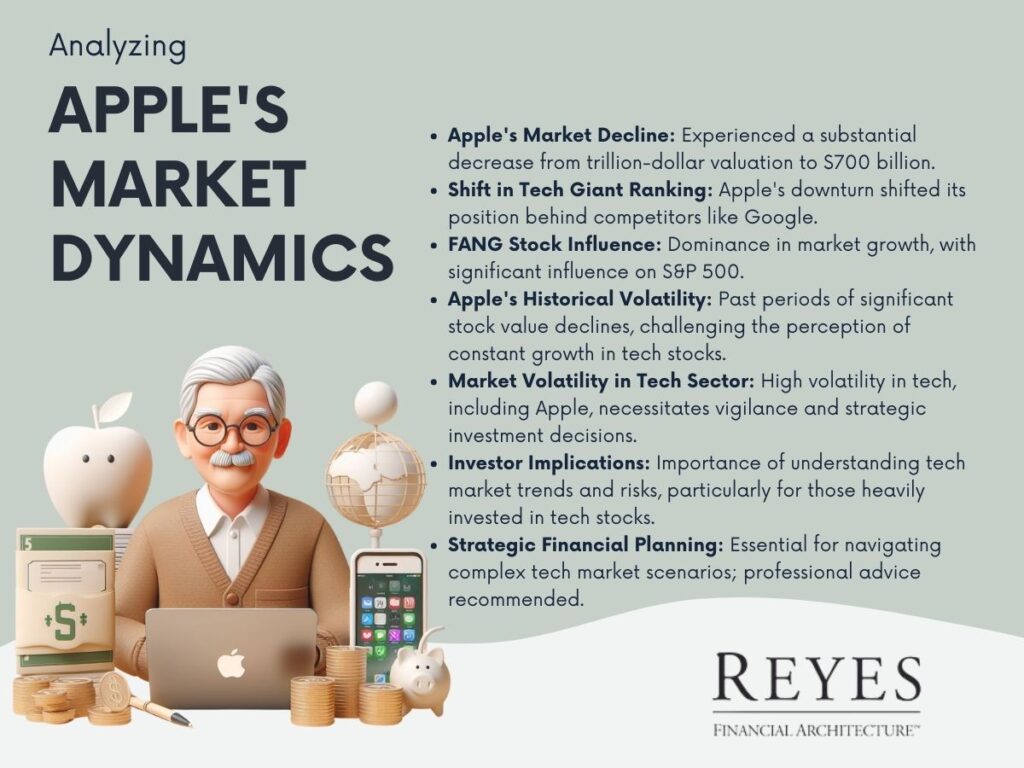Check out this video to get a better understanding of one of the biggest stocks in the market and what influence it is currently carrying out.
In the ever-evolving landscape of the stock market, technology stocks stand out for their potential for high growth and significant volatility. Among these, Apple Inc. has recently drawn attention due to its dramatic shift in market valuation.
Once a titan in the trillion-dollar club, Apple experienced a substantial decline in its market capitalization, shedding light on the unpredictable nature of tech investments. This article delves into the factors behind Apple's market performance, the broader implications for investors, and the importance of strategic planning in navigating the complex and often turbulent world of technology stocks.

In a notable shift within the tech industry, Apple Inc. experienced a substantial decrease in its market capitalization. Once a company with a trillion-dollar valuation, Apple saw its worth plummet to around $700 billion. This decline of over $300 billion in market capitalization is not just a numerical figure; it's indicative of broader market trends and investor sentiments.
Previously competing for the top spot among global companies, this downturn relegated Apple to a lower position, behind other tech giants like Google. This change is a stark reminder of the volatility and competitiveness inherent in the technology sector, where companies continuously compete for market dominance.
FANG stocks, an acronym for Facebook, Apple, Netflix, and Google, have significantly influenced market dynamics. Particularly in 2018, these companies were responsible for 70% of the total gains in the S&P 500. This dominance by a small group of technology companies shows a considerable concentration of market growth within a select segment of the stock market.
The recent downturn in Apple's stock value is not an isolated incident. The company faced similar reductions in 2015-2016 and 2012-2013, with stock value declines of 33% and 42%, respectively. These instances highlight a pattern of volatility in Apple's stock, challenging the notion that tech stocks are always on a rising trajectory.
The technology sector, and companies like Apple in particular, often exhibit high levels of market volatility. This can lead to significant fluctuations, including notable market rallies and downturns. Investors are advised to be vigilant during these periods, potentially using them as opportunities for strategic portfolio adjustments and the selling of securities.
The fluctuations in companies like Apple underscore the risks inherent in stock market investment, especially in the volatile tech sector. For investors with substantial exposure to tech stocks or related indices, understanding market trends and the company's historical performance is crucial. It's important to be aware of these risks and to make informed decisions based on the current economic environment and individual investment objectives.
Given these market dynamics, effective financial planning is essential. Investors should consider seeking professional advice to navigate complex market scenarios. An informed approach, combining real-time market analysis with a clear understanding of individual goals, can aid in developing a balanced and risk-adjusted investment portfolio.
The decline in Apple's market value serves as a pertinent example of the challenges and volatility in tech sector investments. Despite the impressive performance of FANG stocks, they are not immune to market fluctuations. Investors should remain informed, strategic, and cautious in their investment approaches, especially in the rapidly evolving tech industry. Professional financial guidance and a keen awareness of market trends are key to navigating these complexities and achieving long-term investment success.